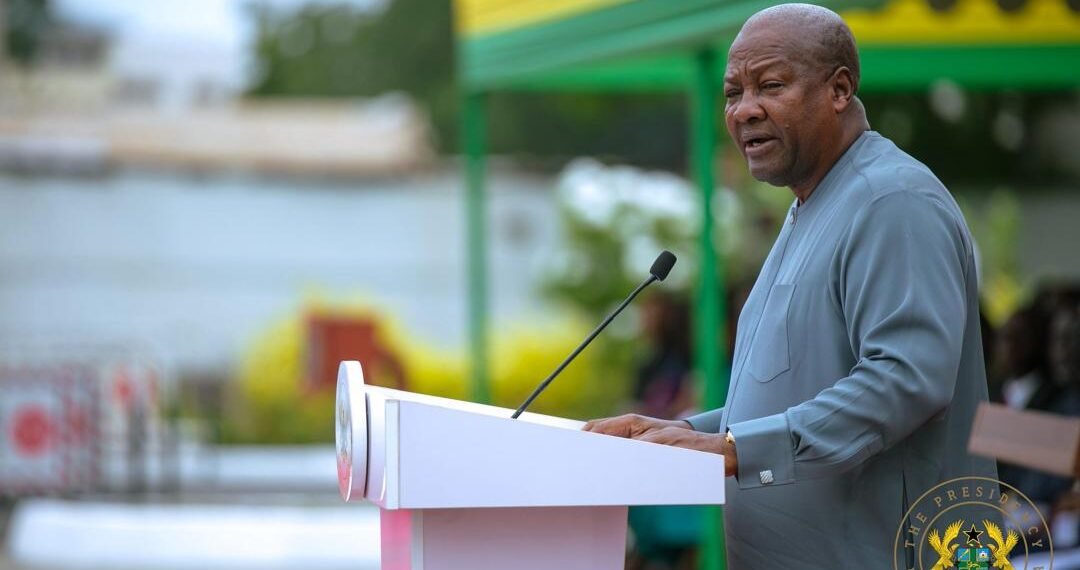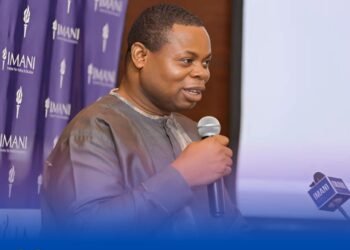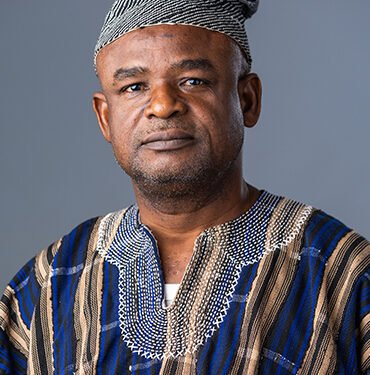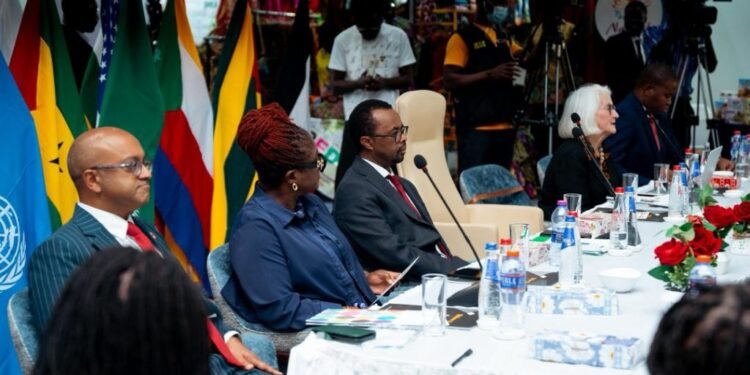President of the Republic of Ghana, HE John Dramani Mahama, has reaffirmed his administration’s unwavering commitment to securing greater national control over Ghana’s natural resources, beginning with the gold sector.
At the official inauguration of the Ghana Gold Board Taskforce, a key initiative aimed at curbing gold smuggling and enhancing accountability, the President described the event as a historic milestone in Ghana’s long journey toward resource sovereignty and economic transformation.
Speaking at the ceremony, President Mahama framed the passage of the Gold Board Act and the launch of the enforcement task force as critical turning points in Ghana’s effort to reverse decades of resource exploitation that yielded little benefit for its citizens.
“Ghana has been blessed bountifully with natural resources, but over the centuries, we didn’t have the human resource, the capital, or the technology, and so we had what they call the GAGS system of natural resource exploitation—where foreign companies that had those three ingredients took huge concessions and mined them over decades with very little coming to the state.”
President of the Republic of Ghana, HE John Dramani Mahama
Drawing on this historical backdrop, the President emphasised that true prosperity for the Ghanaian people can only be achieved when the country asserts greater control over its natural wealth.

According to him, this principle underpins the rationale behind the creation of the Ghana Gold Board (Goldbod), a state institution vested with the sole mandate to buy, assay, and export all gold produced by the country’s small-scale sector and potentially from large-scale producers as well.
Best Example from Botswana
“If we are to create prosperity for our people, then it means that we must take greater control of our natural resources,” President Mahama declared. He referenced international best practices to support his administration’s new resource management direction.
“It’s not only Ghana that is taking greater control of its resources. Botswana is an example. You can’t export one single diamond out of Botswana without committing a crime.
“And so Botswana, together with its foreign partners, exports all the diamonds to the international market, and the money comes back to Botswana. This was not the case with our natural resource—gold.”
President of the Republic of Ghana, HE John Dramani Mahama
President Mahama expressed confidence that the same approach can work for Ghana, and that gold would be just the beginning.
He noted that the country is on the verge of discovering several other important minerals, and underscored that these too must be managed in ways that prioritize Ghanaian ownership and benefit.
“We are discovering many other minerals in Ghana, and we believe that Ghanaians must be the first beneficiaries of the natural resource blessing that God has given us”.
President of the Republic of Ghana, HE John Dramani Mahama
Supporting Ghanaian Companies
He went further to stress the need to support Ghanaian companies in rising to this challenge.“The time has come for Ghanaians to also own gold mines and produce gold for export,” he said.

“We will work with Ghanaian companies that have the equipment, the technology, and the human resources to ensure that they also can establish first-class gold mines and own those gold mines so that Ghana can fully benefit from the resource that we have.”
President of the Republic of Ghana, HE John Dramani Mahama
The President’s comments underscored a broader shift in philosophy toward natural resource governance—one that places national interest and local participation at the centre of policy decisions.
The inauguration of the Goldbod Taskforce represents a vital enforcement pillar of this new architecture.
Charged with ensuring compliance with regulations, the task force is expected to crack down on illegal gold trading and smuggling, both of which have cost the country significant revenue and weakened state oversight for years.
President Mahama commended the leadership of the Ghana Gold Board, led by CEO Sammy Gyamfi, for their swift implementation of reforms, including a streamlined digital licensing system and pricing mechanisms designed to eliminate incentives for smuggling.

These actions, according to the President, demonstrate that the foundation for responsible and transparent gold trading is already being laid.
The establishment of Goldbod and its task force aligns with the reset agenda outlined by the President ahead of the 2024 elections.
By centralising gold buying, assaying, and exporting under a single state authority, the Mahama-led administration aims to ensure that the wealth generated from Ghana’s gold stays in the country and is used to fund development priorities.
With a combination of state-led institutions like the Goldbod, active citizen oversight, and the promotion of capable local enterprises, the President believes Ghana can chart a new course toward shared national prosperity.
READ ALSO: Triad of factors Driving Ghana’s Fight against Crime























